When it comes to commercial roofing, one type stands out as the go-to choice: the flat roof. With its simple yet practical design, flat roofs have become the preferred option for commercial buildings of all sizes. Its versatility and cost-effectiveness make it an attractive option for business owners and property managers alike. Whether it’s a retail store, office building, or warehouse, the flat roof proves to be a reliable and durable solution for commercial roofing needs. When it comes to commercial roofing, there are several options available to choose from. Each type of commercial roof has its own advantages and considerations that you need to take into account. In this article, we will explore the different types of roofs commonly used in commercial roofing and discuss their features and benefits. So, let’s dive in and explore the world of commercial roofing!
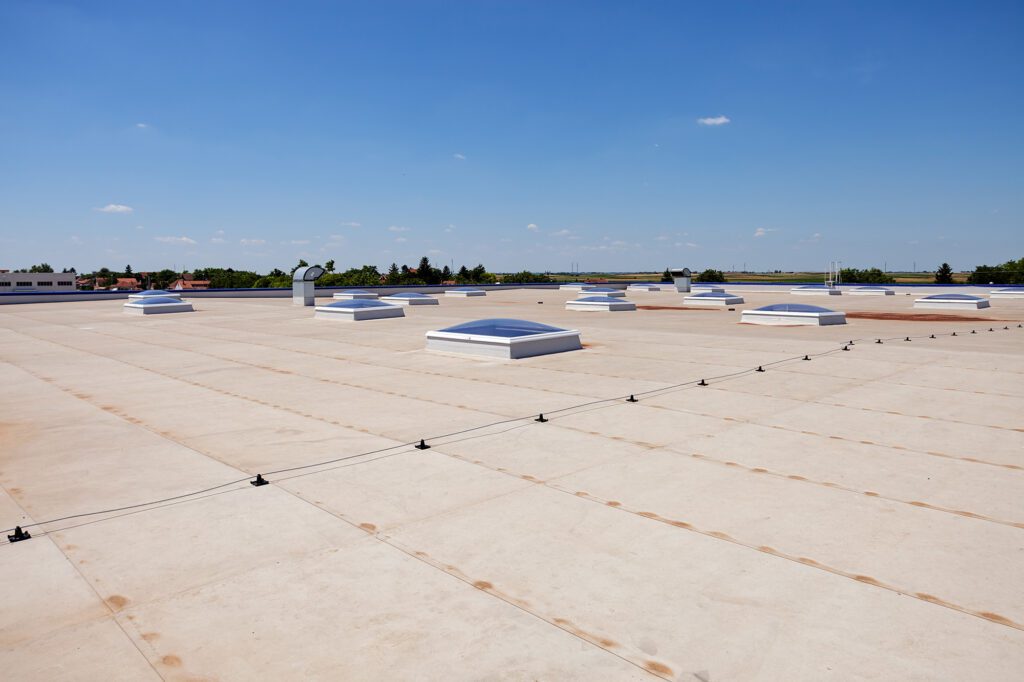
Flat Roofing
EPDM
EPDM, or Ethylene Propylene Diene Monomer, is a popular choice for flat commercial roofs due to its durability and longevity. EPDM roofing membranes are made from a synthetic rubber compound, which makes them resistant to weathering, UV radiation, and ozone. This type of roof is also known for its excellent resistance to punctures and tears, making it a low-maintenance option for commercial buildings. EPDM roofs are available in both black and white colors, offering energy-efficient solutions for any climate.
TPO
TPO, or Thermoplastic Olefin, is another commonly used flat roofing material in the commercial industry. TPO roofs are known for their reflective properties, which make them energy-efficient and contribute to lower cooling costs. They are also highly resistant to punctures, tears, and chemicals, making them suitable for commercial buildings with heavy foot traffic or potential exposure to corrosive substances. TPO roofing systems are available in various thicknesses and colors, offering flexibility in design choices.
PVC
PVC, or Polyvinyl Chloride, roofing systems are highly durable and offer excellent resistance to chemicals, moisture, fire, and punctures. This type of roofing is known for its exceptional strength and long lifespan, making it a cost-effective choice for commercial properties. PVC roofs also have great reflective properties, helping to reduce energy consumption and enhance indoor comfort. Additionally, PVC roofing membranes are available in various colors, allowing for creative and aesthetically pleasing roof designs.
Modified Bitumen
Modified Bitumen roofs are often preferred for their flexibility and ease of installation. These roofs are made from asphalt, which is modified with rubber or plastic polymers to enhance its durability and resistance to extreme weather conditions. Modified Bitumen roofs are built with multiple layers, providing additional protection against UV radiation, punctures, and tears. This type of roofing system is also known for its ease of maintenance and repair.
Built-Up Roofing
Asphalt
Asphalt roofs, also known as tar and gravel roofs, have been a popular choice for commercial buildings for many years. They are constructed by building up layers of bitumen and reinforcing materials, such as fiberglass or organic felts. The final layer is typically a layer of gravel or mineral granules, which provide additional protection against UV radiation and help to extend the lifespan of the roof. Asphalt roofs are known for their excellent waterproofing capabilities and high resistance to fire.
Coal Tar
Coal tar roofs, although less common nowadays, have been traditionally used in commercial roofing due to their exceptional resistance to chemical exposure and UV radiation. These roofs are constructed by alternating layers of coal tar and reinforcing materials, similar to asphalt roofs. Coal tar roofs are highly durable and can withstand extreme temperatures and weather conditions. However, it’s important to note that coal tar roofs require regular maintenance and may emit strong odors during installation.
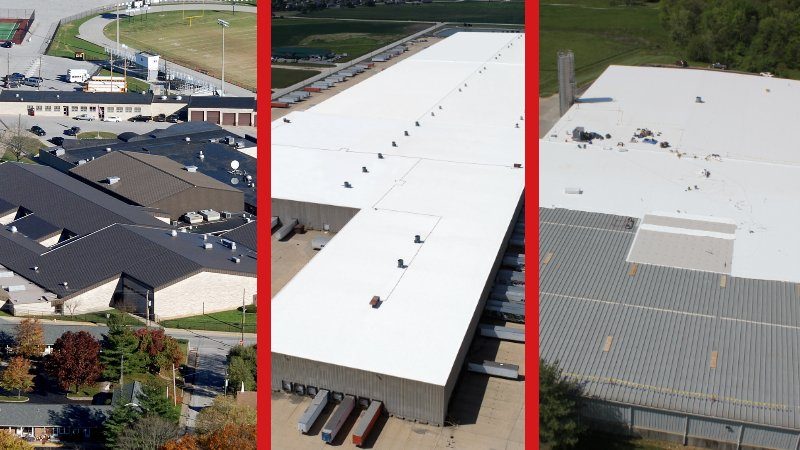
Metal Roofing
Standing Seam
Standing seam metal roofs are a popular choice for commercial buildings due to their sleek and modern appearance. These roofs consist of vertically oriented panels with seams that are raised above the level of the roofing panel. This design not only adds aesthetic appeal but also provides superior weather resistance and prevents water from seeping into the building. Standing seam metal roofs are highly durable, low-maintenance, and known for their longevity.
Metal Shingles
Metal shingles offer the elegance of traditional roofing materials, such as slate or tile, combined with the durability and lightweight properties of metal. These shingles are typically made from steel, aluminum, or copper and come in various shapes and sizes to mimic the appearance of other roofing materials. Metal shingles provide excellent resistance to fire, wind, and hail, making them a reliable choice for commercial buildings in areas prone to severe weather conditions.
Rigid Metal Panels
Rigid metal panels, also known as corrugated metal roofs, are a versatile option for commercial roofing. These panels consist of ribbed metal sheets that provide strength, durability, and excellent water shedding capabilities. Rigid metal panels are available in various substrates, including steel, aluminum, and copper, offering a wide range of design options. They are also lightweight and easy to install, making them a cost-effective solution for commercial roof applications.
Green Roofing
Extensive
Extensive green roofs, also known as Eco roofs, are a sustainable and environmentally friendly choice for commercial buildings. These roofs are covered with a thin layer of lightweight vegetation, such as sedum or grass, and require minimal maintenance. Extensive green roofs offer many benefits, including improved insulation, reduced stormwater runoff, noise reduction, and increased biodiversity. They also provide aesthetic appeal and can contribute to a healthier and greener urban environment.
Intensive
Intensive green roofs are more like traditional gardens or parks, as they can support a wider variety of plants, trees, and even small water features. These roofs require a thicker layer of soil and a higher level of maintenance compared to extensive green roofs. However, they offer additional benefits, such as increased usable space, better air quality, and enhanced aesthetics. Intensive green roofs can create a peaceful and relaxing environment for commercial buildings, providing a retreat from the urban hustle and bustle.
Semi-Intensive
Semi-intensive green roofs offer a middle ground between extensive and intensive options. They typically consist of a mix of vegetation, including low-growing plants, shrubs, and small trees. Semi-intensive green roofs provide a balance between minimal maintenance and enhanced aesthetic appeal. They can also offer some of the benefits of extensive and intensive green roofs, such as improved insulation, stormwater management, and biodiversity.
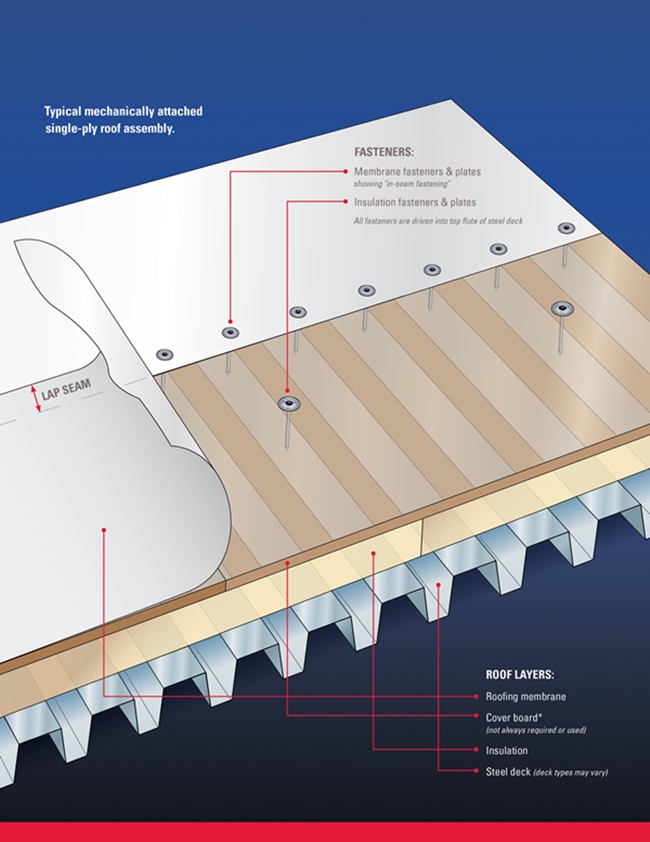
Single-Ply Membrane Roofing
EPDM
EPDM, as mentioned earlier, is a popular single-ply membrane roofing material due to its durability and longevity. EPDM membranes are lightweight, easy to install, and provide excellent resistance to UV radiation, weathering, and ozone. They can be fully adhered, mechanically fastened, or ballasted, depending on the specific requirements of the commercial building. EPDM roofs offer high puncture resistance, making them suitable for commercial properties with high foot traffic or potential mechanical damage.
TPO
TPO roofs, also mentioned earlier, are another common single-ply membrane roofing option for commercial buildings. TPO membranes are known for their energy-efficient properties and excellent resistance to chemicals, punctures, and tears. They can be installed using various methods, including mechanically attached, fully adhered, or ballasted, depending on the specific application. TPO roofs are available in different thicknesses and colors, allowing for customization and design flexibility.
PVC
PVC roofs, also discussed earlier, are highly durable and offer excellent resistance to chemicals, moisture, and fire. PVC membranes are mechanically fastened or fully adhered to the commercial building’s roof deck, providing superior waterproofing protection. They are also known for their energy efficiency and reflective properties, contributing to lower cooling costs. PVC roofs can be a great long-term investment for commercial buildings due to their longevity and low maintenance requirements.
Spray Polyurethane Foam Roofing (SPF)
Roof Coatings
Spray Polyurethane Foam, or SPF, roofing systems offer a unique solution for commercial buildings. SPF roofs consist of a mixture of isocyanate and polyol that expands to create a seamless and highly insulated foam layer on the roof. This foam layer acts as both insulation and roofing material, providing excellent thermal resistance, waterproofing, and protection against UV radiation. SPF roofs can be further enhanced with protective coatings, such as acrylic or silicone, to increase their durability and extend their lifespan.
Spray Foam Insulation
In addition to its roofing capabilities, Spray Polyurethane Foam (SPF) can also be used as a highly efficient insulation material. By applying SPF insulation to the underside of the roof deck, commercial buildings can achieve superior thermal resistance and energy efficiency. SPF insulation eliminates air leakage and significantly reduces heat transfer, contributing to lower heating and cooling costs. It can also provide sound insulation and improve indoor comfort for commercial spaces.
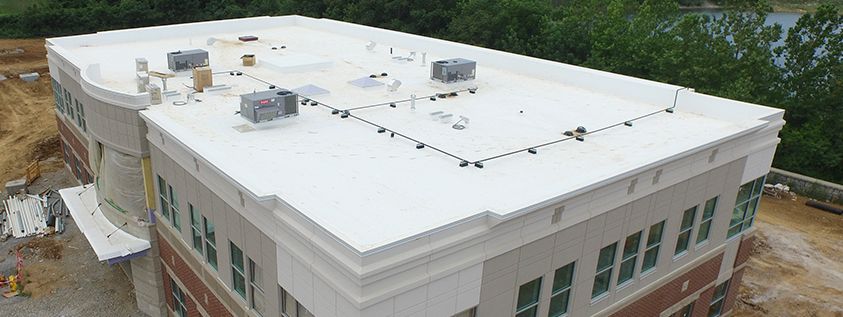
Modified Bitumen Roofing
APP
Modified Bitumen roofing systems, as mentioned earlier, can be made with different additives to enhance their properties. APP, or Atactic Polypropylene, is one such additive that increases the roof’s resistance to UV radiation and adds flexibility to the material. APP modified bitumen roofs are typically torch-applied, ensuring a strong and secure bond between the roofing components. This type of roofing is ideal for commercial properties with complex roof geometries or areas with high foot traffic.
SBS
SBS, or Styrene Butadiene Styrene, is another popular modifier used in modified bitumen roofing systems. SBS modified bitumen roofs offer enhanced flexibility and elongation properties, making them highly resistant to cracking in extreme temperature conditions. SBS roofs can be installed using various methods, including hot asphalt, cold adhesive, or heat welding. The flexibility of SBS modified bitumen allows it to accommodate building movements and prevent water penetration, making it a reliable choice for commercial roofs.
Thermoplastic Olefin (TPO) Roofing
Advantages
TPO roofing systems offer several advantages for commercial buildings. First and foremost, their reflective properties contribute to energy efficiency and lower cooling costs. TPO roofs are also highly resistant to punctures, tears, and chemicals, providing long-term protection for the building. They are lightweight and easy to install, which can help reduce installation time and costs. TPO roofs are available in different colors, allowing for design flexibility and aesthetic appeal.
Disadvantages
Despite their many benefits, TPO roofs have a few considerations to keep in mind. One potential disadvantage is their susceptibility to installation errors. Improper installation can lead to premature failure of the roofing system. TPO roofs also have a relatively shorter track record compared to other roofing materials, meaning the long-term performance and durability may still be under evaluation. It’s important to work with experienced professionals to ensure proper installation and maximize the benefits of TPO roofing.
Considerations
When considering TPO roofing for your commercial building, it’s important to assess the specific requirements and conditions of your project. Factors such as climate, building design, and foot traffic should be taken into account. Additionally, it’s essential to choose a reputable manufacturer and ensure that the TPO membrane meets industry standards and certifications. Proper installation, regular maintenance, and periodic inspections are crucial for maximizing the lifespan and performance of TPO roofing systems.
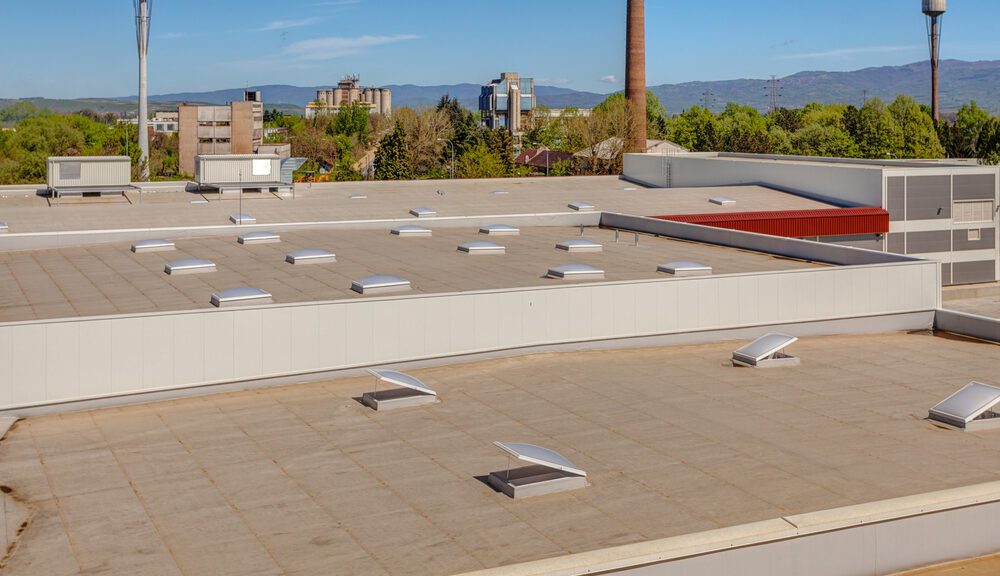
Ethylene Propylene Diene Monomer (EPDM) Roofing
Advantages
EPDM roofing systems offer a range of advantages for commercial buildings. Their durability, resistance to weathering, UV radiation, and ozone make them a reliable choice for long-term protection. EPDM roofs are known for their low-maintenance requirements, reducing the overall operational costs of the building. They are also available in both black and white colors, providing options for energy efficiency and design preferences. EPDM roofs are lightweight and easy to install, making them an efficient choice for commercial projects.
Disadvantages
While EPDM roofs have numerous advantages, there are a few considerations to keep in mind. The seams of EPDM roofing systems can be a potential weak point, requiring proper sealing and maintenance. Additionally, EPDM roofs may not be as puncture-resistant as other roofing materials, especially in areas with high foot traffic or potential mechanical damage. Regular inspections and timely repairs can help mitigate any potential issues and extend the lifespan of EPDM roofing systems.
Considerations
When considering EPDM roofing for your commercial building, it’s important to consider the specific requirements and conditions of the project. Factors such as climate, potential impact from foot traffic, and building design should be taken into account. It’s essential to work with experienced professionals to ensure proper installation, including effective seam sealing. Regular inspections and maintenance, along with prompt repairs, will help maximize the lifespan and performance of EPDM roofing systems.
Photovoltaic (PV) Roofing
Advantages
Photovoltaic (PV) roofing systems offer numerous advantages for commercial buildings. They can generate clean and renewable energy, resulting in reduced reliance on traditional energy sources and lower utility costs. PV roofs can also contribute to environmental sustainability and provide additional insulation for the building. These roofs offer versatility in design, with different solar panel options and configurations available. PV roofing systems can be a long-term investment that provides both energy savings and a positive environmental impact.
Installation Considerations
The installation of PV roofing systems requires careful planning and coordination with a qualified solar installer. Factors such as roof orientation, shading, and structural capacity need to be evaluated to ensure optimal performance and safety. It’s important to work with professionals who have experience in solar installation and are knowledgeable about the specific requirements for commercial buildings. Building permits and local regulations should also be considered during the installation process.
Maintenance
PV roofing systems generally require minimal maintenance. Regular inspections to ensure the panels are clean and free of debris can maximize their efficiency. If any issues arise, such as a drop in energy production or damaged panels, it’s important to contact a professional to assess and address the problem. PV roofing systems typically come with warranties that cover performance and equipment, providing peace of mind and protecting your investment. Monitoring the energy production of the system can also help identify any potential issues early on.
Now that you have a comprehensive understanding of the different types of roofs commonly used in commercial roofing, you can make an informed decision based on your specific project requirements. Remember to consider factors such as climate, building design, durability, maintenance, and energy efficiency when selecting a roofing system. Working with experienced professionals and reputable manufacturers will ensure proper installation and maximize the lifespan and performance of your commercial roof.